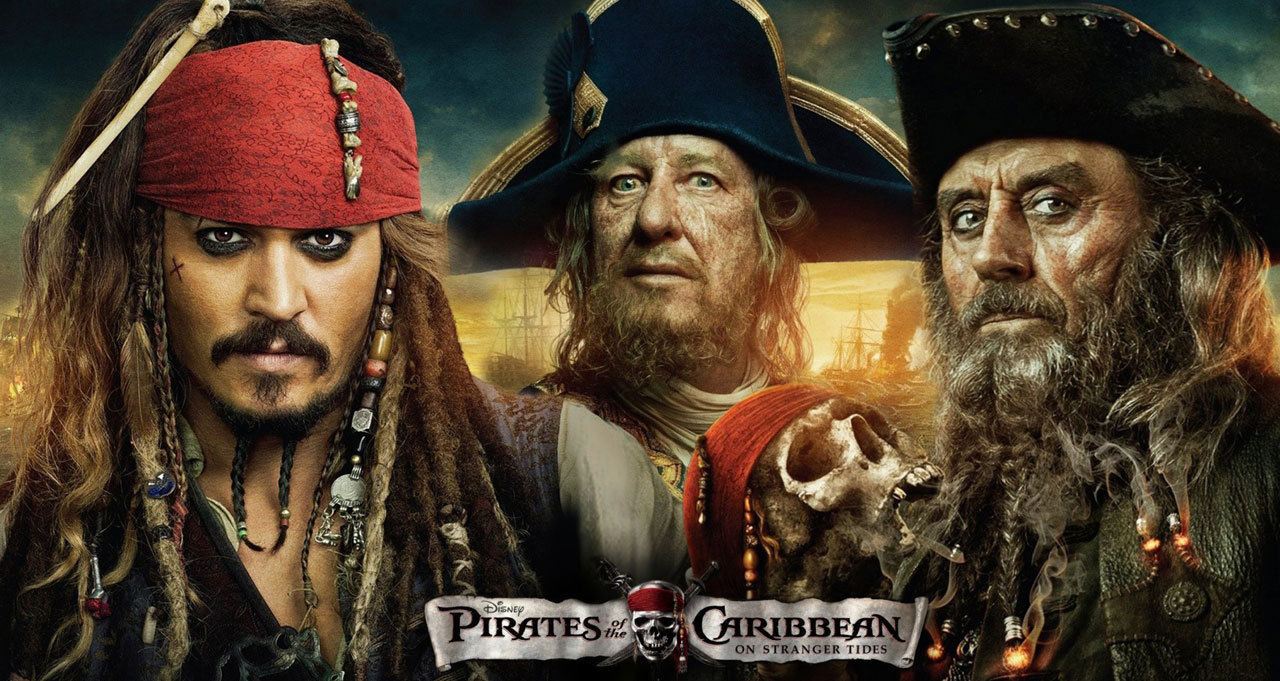By The Landlord
"Damnation seize my soul if I give you quarters, or take any from you." – Edward Teach, aka Blackbeard, before his final battle.
“It's better to swim in the sea below / than to swing in the air and feed the crow, / says jolly Ned Teach of Bristol.” ― Benjamin Franklin
“There was a sound in their voices which suggested rum.” ― Robert Louis Sevenson, Treasure Island.
Yaaarrrr! Well then, me hearties, this topic had to come sometime. But what is it about these historic figures, these murdering, stealing brigands whose sole aim take everything and give nothing in return? And why are there so many songs about them? Well, as the author, academic and political activist Robert Lessig said in his book Free Culture: The Nature and Future of Creativity: “Every generation welcomes the pirates from the last.”
The culture has a romance to it, even though the reality was undoubtedly far from it, but history, as well as books and movies, all tend to add a rosy glow to the blood and gore, a tint to the treachery and a shimmer to the cutlass. Pirates are generally defined as sea-borne robbers, often stateless or outlaws from their own country, but this week's topic could cover modern piracy as well as other contexts, such as stealing copyright material, or even, in a more light-hearted way, pirate radio, but the main thrust will certainly be about the buccaneering type, whose mantra, according to Ralph Waldo Emerson, was: "Live in the sunshine, swim in the sea, drink the wild air."
Piracy, in theory, is all about freedom to do what you want, and to answer to no one, but of course there is always a cost to that, not merely to everyone else, but to pirates themselves. As Terry Pratchett put it in his book The Colour of Magic: "Some pirates achieved immortality by great deeds of cruelty or derring-do. Some achieved immortality by amassing great wealth. But the captain had long ago decided that he would, on the whole, prefer to achieve immortality by not dying.” So which songs will survive, and which will perish on the high seas? It's time to cut loose with anything relating to pirates or piracy from any era or context, and in any genre, from folk to classical, reggae to heavy metal and rock.
But how did it all begin? Songs about pirates are likely to be as old as piracy itself, with the earliest known documented piracy in the 14th century being of the so-called Sea Peoples, who acted as ocean raiders on ships through the Mediterrenean and Aegean, though piracy was almost certainly happening as soon as humans began to take to the water. Could the Vikings we regarded as pirates too, for example?
And so the movie ship sails on …
The Golden Age of Piracy is that which most of the western folklore centres upon including of course, the Pirates of the the Caribbean film franchise. First, from the buccaneering period from 1650-1680, where Anglo-French seamen based in Jamaica and Tortuga attacked Spanish ships, to the 1690s where more long-distance pirates robbed the East India and Muslim merchants in the Indian Ocean and Red Sea. And then, the post-Spanish Succession period from 1716 to 1726, when Anglo-American sailors and privateers were left unemployed after that war, and cut loose in the Caribbean, the North American seaboard and the West African coast.
Who are the most famous? Blackbeard, aka Edward Teach, who intimidated enemies by coiling smoking fuses into his long, braided facial hair and by slinging multiple pistols and daggers across his chest. In November 1717 he captured a French slave ship, later renamed the Queen Anne’s Revenge, and refitted it with 40 guns. With that extra firepower he then blockaded the port of Charleston, South Carolina, until the town’s residents met his demands for a large chest of medicine. After laying low for a few months in North Carolina, Blackbeard was killed in battle with the British Navy. Legend holds that he received 20 stab wounds and five gunshot wounds before finally succumbing. Who knows whether this is true, but his charisma and presence must have been immense. Actor Ian McShane, who played him in the film franchise, described him as the most infamous of all and that "he's one of those characters for which most of the work is done for you before you start." So while many pirate songs will cover older genres such as folk, among the many songs about him this from the metal sphere, while not normally my thing, seems appropriate, not merely in the band name, but in the sound, to the cut and thrust of a violent life:
Your songs might also mention any number of real or fictional pirates, from Italy's 16th-century pirate brothers Aruj and Hizir Barbarossa to France's Jean-David Nau, known as L’Olonnais, England's John "Calico Jack" Rackham to Henry Morgan from Wales, or Scotland's Captain William Kidd. And arguably Sir Francis Drake was known by Elizabeth I as "my pirate" due to his clever raids on the Spanish. But in this topic, as well as the famous men, could also cover women pirates, including the cross-dresser Mary Read, also known as Mark, who was friends with the extraordinary Irish female pirate Anne Bonny. Tall, red-headed and extremely ruthless and clever, Bonny raided men's hearts (or at least their groins) as well as their purses, and was as fierce and deadly as any male counterpart. She took Calico Jack, aka John Rackham as her lover, but unlike him, escaped imprisonment and hanging. Before his death, she told him: "I am sorry to see you here, but if you had fought like a man, you needn't be hanged like a dog," after he had decided to surrender to pirate hunters instead of fight.
Anne Bonny (1697–1720). Engraving from Captain Charles Johnson's General History of the Pyrates (1st Dutch Edition, 1725)
But there is also a treasure of fictional pirates, from Long John Silver to Captain Pugwash, with whom there are many great accompanying songs. In Stevenson's book, for example, comes the song Fifteen Men on a Dead Man's Chest. And then there is the theme tune from the children's TV animation for Pugwash, adapted from the books by John Ryan. Disappointingly, perhaps, hyped by student rags, and standup comedians in the 1970s and 80s, other characters do not have innuendo-rich names such as Master Bates, Seaman Staines or Roger the Cabin Boy, but Master Mate, Tom the Cabin boy (the only bright one), so there is a sailor called Willy. And let us also enjoy its rich selection of colourful phrases:
Dolloping doubloons and dolloping dolphins! Coddling catfish! Lolloping landlubbers! Suffering seagulls! Staggering stalactites! Nautical nitwits! Plundering porpoises! Kipper me capstans! Tottering turtles! Dithering dogfish! Scuttling cuttlefish! Stuttering starfish! Blistering barnacles! (also used by Captain Haddock in the Tin Tin books). Shuddering sharks!
Captain Pugwash
And if you're looking for girl pirates, look no further than this wonderful children's book in which a boy dreams of smart, sassy girls who set sail on an adventure using his house for a hull:
The Night Pirates, in which girl pirates take charge
While piracy may be associated with freedom from conventional laws, the travails and dangers of a life at sea also came with a certain discipline emanating from the necessity to run a tight ship. There are several historical documents pertaining to the so-called pirate code. In those of Captain Charles Johnson regarding the articles of Bartholomew Roberts, were are told, for example that:
- Every man shall have an equal vote in affairs of moment. He shall have an equal title to the fresh provisions or strong liquors at any time seized, and shall use them at pleasure unless a scarcity may make it necessary for the common good that a retrenchment may be voted.
- Every man shall be called fairly in turn by the list on board of prizes, because over and above their proper share, they are allowed a shift of clothes. But if they defraud the company to the value of even one dollar in plate, jewels or money, they shall be marooned. If any man rob another he shall have his nose and ears slit, and be put ashore where he shall be sure to encounter hardships.
- None shall game for money either with dice or cards.
- The lights and candles should be put out at eight at night, and if any of the crew desire to drink after that hour they shall sit upon the open deck without lights.
- Each man shall keep his piece, cutlass and pistols at all times clean and ready for action.
And much more besides. Elements of democracy with 'equal vote' come at a price – strict discipline and efficiency are required for piracy, and the banning of gambling for money with dice or cards, and the keeping cutlass and pistols clean are particularly enlightening.
Somali pirates on the MV Faina in 2008
But what of modern piracy? The coast of Somalia in recent years has been a hotspot for those with using small ships and armed with hand-held rocket launchers and machine guns. But grim stories of murder, robbery and kidnappings can be double-edged. In 208 Somali pirates captured the MV Faina, a Ukrainian ship carrying tanks and military hardware, accused European firms of dumping toxic waste off the Somali coast and declared that the $8m ransom for the return of the ship will go towards cleaning up the waste. The ransom demand is a means of "reacting to the toxic waste that has been continually dumped on the shores of our country for nearly 20 years", Januna Ali Jama, said a spokesman for the pirates "The Somali coastline has been destroyed, and we believe this money is nothing compared to the devastation that we have seen on the seas."
But pirates don't only have to be at sea, do they? Here's a road pirate song: "To me, way, hey, tow them away,/The Lincoln Park Pirates are we,/From Wilmette to Gary, there's nothin' so hairy/ And we always collect our fee!/So it's way, hey, tow 'em away,/We plunder the streets of your town,/Be it Edsel or Chevy, there's no car too heavy,/And no one can make us shut down."
And what other piracy is there. Dodgy DVDs anyone? Is home taping killing music? We've got plenty of rum in stock at the Bar this week, and manning the pumps and no doubt commanding the compass for your song directions is Pirate Captain ParaMhor! Place your songs in the hold below for a real treasure chest of booty to pile up by last orders on Monday (11pm UK time), so we can survey the gold and bejewelled playlists next Wednesday. Yo ho ho and away me hearties!
New to comment? It is quick and easy. You just need to login to Disqus once. All is explained in About/FAQs ...
Fancy a turn behind the pumps at The Song Bar? Care to choose a playlist from songs nominated and write something about it? Then feel free to contact The Song Bar here, or try the usual email address.






